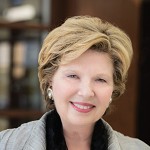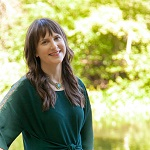- Deal Activity Slows for Asset-Based Lending, but Portfolio Performance Stays Strong
- Exploring the Future of Supply Chain Finance: Insights from SFNet's Inaugural Conference
- Navigating 2025: SFNet’s Asset-Based Capital Conference Returns to Las Vegas with Premier Insights and Networking
- Siena Lending Group Announces Leadership Transition Plan
- Celebrating the Achievements of SFNet Chapters
Gail K. Bernstein Reflects on Her Successful Career in ABL
By Eileen Wubbe

Gail K. Bernstein was executive vice president, national investment manager for PNC Business Credit, located in Los Angeles, CA. Prior to September 2013, she was the marketing manager of PNC Business Credit-Western Region, a de novo office that she opened in 1998.
Before joining PNC, Bernstein was the national sales and marketing manager for Wells Fargo’s ABL unit. She also held the post of senior credit officer and national marketing director for Signal Capital Corporation’s (formerly First City Financial) asset-based unit as well as managing director of Bank of America’s Latin American Private Banking Division, where she managed 80 employees and $4 billion in AUMs. Besides her extensive experience in ABL, her career encompasses a specialization in international lending and investment management. She has traveled extensively in Latin America and is bilingual in English and Spanish.
After 20 years with PNC, Bernstein retired on August 30, 2019.
As you reflect back, what accomplishments are you most proud of in your career?
Mentoring younger people would have to be at the top of my list. PNC has a program in which mentors at senior levels follow young women coming out of the development academy, as well as college graduates that the bank hires. This is done for the first five years of their careers. I enjoy being a mentor, and I was asked to be what we call an executive supporter, helping younger women and men discuss their careers or related subjects. As I would visit different offices, I would put out an e-mail and we’d get together for breakfast, lunch or an individual meeting. I’ve talked through career changes with a lot of young women over time and I’m often a speaker for young professionals conferences, whether they are tied to SFNet or other organizations.
The message is the same to young women and young men: be flexible, especially about relocation. Let others know what your career aspirations are; they won’t know unless you tell them. Think about what you would like to do whether that is in the department you work in or another. Become as familiar as you can with other areas within your organization and educate yourself on what other opportunities there are within your own organization (most post open positions). I think everyone should take charge of their own career. I thought in the beginning of my career that if I worked hard, I would be promoted. Finally, one day, an opportunity presented itself. Someone who ran one of the foreign banks we dealt with came in unannounced, and I was sent to lunch with him, even though I had never been on a customer call. I approached our department head and said, “I think I did an okay job, but hopefully he wasn’t insulted getting the most junior person in the group. If I’m not included in customer calls, how can I improve? How do I enhance my skill set for myself and for the bank?”
I was on a business trip traveling to South America within three months. My tendency at times was to be overly direct – everyone knows I speak my mind; there is no hidden agenda with me. But this time, I went in and asked my boss to be part of the solution, and that experience taught me to approach management with recommendations that allow them to be included. When you ask people for help, they adopt a different attitude and that paves the way for progress.
What are some professional milestones that come to mind?
I’m proud of the fact that I was the first woman to travel for a West Coast bank in Latin America. Only one woman had traveled there from the East Coast, and she was from Citicorp. I have been honored by a charity for my humanitarian work. And last year, I was named one of the most influential persons in Los Angeles by the Los Angeles Business Journal.
Southern California supported women early on and Joyce White, Vicky Balmot and I all came from the same California financial institution and we all ended up in leadership positions elsewhere. There are more women running P&Ls today - but not as many as there should be. I always point out that there are many women underwriters and relationship managers, and women in other roles of leadership, but the money and the power is in sales and running a P&L. The typical progression after the training program in asset-based lending is field exam and then underwriting or relationship management; I always tell women not to forget the sales side. Sales generate revenue for the organization and many salespeople go onto sales management and continue on to run regions, divisions and lines of business.
What were your biggest advances and changes in your career?
I started my career in international banking and then moved over to asset-based lending. For two years, I moved back into the banking world and took a leadership position in wealth management. I first traveled Latin America when I was 26 and moved to Mexico to work as the assistant representative of our office there when I was 28, and became a top performer there as well. It took a few months, but I quickly identified the wealthy families in Latin America who owned businesses that I should call on and convinced First Interstate Bank to underwrite and share in the fee income instead of just being a participant. Once they got a taste of that, they never looked back.
I was not involved in asset-based lending before I joined First City Financial, but asset-based lending found me; it was a startup subsidiary and they needed to know how to interface with the bank. While I had no ABL experience, I was a known commodity and had credibility with the credit committee at the bank. Having restructured several loans in Latin America, I had the credit experience that they needed. I was willing to transfer to the subsidiary. Being open to new areas is always a plus - you’ll learn, and then you’ll have more to offer in the future.
When I first entered the banking industry, there were no computers, no cell phones, no faxes. So, the technology changes have been phenomenal in my lifetime; they’re all an improvement that continues to enable us to be more efficient and more responsive. We’re able to access information instantaneously. I sometimes think the younger generation has no downtime, that they’re stimulated 24/7 and have little time just to daydream. Balance is key - you have to work sometimes at scheduling downtime and not being on 24/7.
What were some of your biggest challenges throughout your career? How did you overcome them?
The biggest challenge in my career was that there weren’t any women to mentor me and help pave the way. I was the first woman in the credit department. When I joined the international group, I was the first woman to travel in the group. My boss said, “Gail, they want you to be as competent as a man, but nobody wants you to be a man.” I took that piece of advice to heart; it served me well.
During one of the calls I made in Latin America, the Director General grilled me with his questions, but because I was able to answer them, by the end of the call he offered the bank’s driver to take me to my next appointment. So I felt that I had won him over. Sometimes the win might be small, but it made me more confident in my skills.
I believe that being the oldest of five children helped. I developed leadership skills as president and/or treasurer of a number of organizations. Volunteer work and school activities help develop you and build strengths that help in your career. I felt that education was my way to get ahead. All these things are important in life and helped me in my career - and were fun, too.
What did you gain by being involved with SFNet, both on the National and Chapter levels?
I think organizations like SFNet help you to develop leadership skills. When you are asked for your opinion, or to be on a committee, I think you should volunteer your time and energy.
I was involved in the local California chapter of the SFNet first. On the national level, I was chair of the Education Committee last year and again this year and co-chair prior to that. We have been primarily focused on the educational content and in bringing on more online programs. As chair of the Education Committee, I’ve been on the Executive Committee of the National Board. I served as president of the California chapter for two years, chairwoman for two years, and remain on the Chapter Board and co-chair the women’s committee. I was a speaker at the SFNet YoPro Leadership Summit in 2018 and again at this year’s Summit on August 28-29 in Chicago.
It’s very important to give back. That is how I was taught and have always incorporated that into my life both to the industry and to charitable organizations. As I went to college on full scholarship, that is a particular focus of mine. I currently serve on the Board of Regents of my undergrad alma mater. The World Bank has a special relationship with SFNet and hired them to write/teach a class on asset-based lending in Bogota, Colombia and I was one of the instructors who taught the class in Spanish. I have now been asked to take on another project with the World Bank post-retirement, as part of a team that will introduce asset-based lending in Mexico. You can be fluent in a language, but not accustomed to using business terms – and my multilingual fluency has and will continue to help me in working with the World Bank on behalf of SFNet.
What advice would you give to women entering the ABL field today?
Join a local chapter of SFNet, get on a committee and attend the events - that’s how you meet other people. Most chapters have YoPro groups and women’s committees that offer special programs. The Women in Commercial Finance Committee was originally developed because we didn’t want women to walk into the annual convention, be in a sea of people and not know anyone. It has evolved into a major force within SFNet, arranging for prominent speakers, providing training, networking and mentoring for younger women.
YoPro groups are made up of young professionals from many disciplines, so you meet others beyond the ABL world. Hopefully, the more people you know, the more you can pass business back and forth to each other. I have become friends with many people with whom I’ve done business over the years, and that builds your community. I know that Millennials have Glassdoor and other ways to check salaries, but it’s always good to have a network to check in with and run ideas by.
I think you have to be flexible to move forward in your career, and to take risks with relocation or new jobs for career advancement. I always believed in myself and knew that I could make it happen. Men will look at a job position and say, I have maybe 50 percent of the required skills, but I can do this job. Many women look at the same opportunity and say, well, I only have 50 percent of the skills, I had better not apply. No one has 100 percent of the required skills, and if you think you’re the best candidate and can do the job, go for it - if you don’t try, you’ll never know.
If you’re told that you are not ready or don’t have enough experience, ask what courses you can take or what other experiences could help you improve to get to that position of readiness. At PNC, a development plan and discussion are part of our performance review process to address and identify the next step in your career and all that you need to do to get there.
I’ve always been a take-charge kind of person and, even in high school, if I didn’t see that someone was taking charge, I would. Sometimes you can overbook yourself that way, but I was always up for a challenge and liked to try new things. I had only been on a plane to San Francisco and back once prior to leaving for my junior year abroad in Spain, so I had never been away from home - but I didn’t give it a second thought. I found it exciting, and it taught me to be more open to other ways of thinking; it instilled tolerance. I learned that there is no better way to be exposed to ideas outside the American way of thinking than to jump in and take advantage of international opportunities. I think it makes you a broader-minded person, open to innovation and new ideas.
How can women continue to move into leadership roles in the commercial finance industry?
As I mentioned earlier, be open to trying new things, and open to possible relocation in order to broaden the number and quality of the opportunities available to you. Look at others whom you admire, see how they make choices, and how they’ve progressed in their careers. Review your skill set and determine where you would like to take your career and investigate other positions that would help to build that skill set, filling in with educational courses as appropriate.
When we interviewed at PNC for our development program, we liked candidates to have at least two accounting classes. Sometimes I’ll speak at Loyola-Marymount or USC, and I’ll say that if you’re interested in banking, you should have some accounting in your background so that you understand basic accounting principles.
Most importantly, surround yourself with mentors. Just because somebody is very senior, don’t be intimidated by titles - ask if you can go for lunch. Sometimes, we just get busy and forget to ask you. Most people are happy to be a mentor, so get to know as many senior people in your organization as possible. Have some specific questions for them and do a little bit of research to make the best use of your time with them. Take charge of your career, be proactive and let people know what you would like to do. If you don’t know exactly what you want to do, talk to as many people as you can to learn as much as you can and narrow things down.
When I went to work for the private banking group, I spoke Spanish. I had lived in Mexico. I had traveled to many South American countries. So, they figured I could learn the products. I was already in a leadership role, so I moved over to wealth management. The travel became too much because I had a young daughter and was a single mother so I decided to return to asset-based lending, which would require only domestic travel. Now I’m going back to my roots of international banking to work with the World Bank in Mexico - so it’s coming back around. I had hoped it would because I always loved international banking.
What are your industry predictions for the next few years?
Statistic after statistic demonstrates that diverse boards and management teams result in more profitable companies - and yet, where are we? California had to pass a law to require that the boards of directors of public companies should comprise 20 percent women. If quotas are established and laws such as these are passed, diversity and inclusion will finally be achieved. And then, hopefully, quotas will no longer be needed as companies will find that better decisions result with women and other diverse people on the board. Unfortunately, not all corporations are doing this voluntarily at the present time, but we are making progress.
Corporations also are beginning to look at proactively awarding contracts to women- or minority-owned businesses. With more women and minorities moving up the corporate ladder, maybe in a decade we’ll have a lot more diversity, which will lead to better business decisions.
I think our world will continue to be digital. Technology will continue to reduce costs and create synergies, help you to meet and network faster and to be more responsive. But I don’t think we’ll ever get to a point where you are able to eliminate people from the equation.
What are your plans for retirement?
I mentioned that I’m about to take on another project with the World Bank post-retirement, being part of a team that will help to establish asset-based lending in Mexico, providing me with the opportunity to apply my skills and experience.
I also have been approached to consider sitting on boards of directors, which will allow me to apply that same experience to assisting companies and organizations, which I will enjoy. I will, of course, continue my mentoring and volunteer work, which is extremely important to and fulfilling for me.
I’m retiring from PNC, but I don’t know that I’ll ever be fully retired. I would like to work part-time and I plan to continue to travel considerably - I’ve already booked two trips for 2020. I love theater, I love music, I support the LA Philharmonic and the arts (in addition to many other worthy causes) - and there are so many opportunities to enjoy the arts in southern California. There will be no slowing down - not for the foreseeable future.



